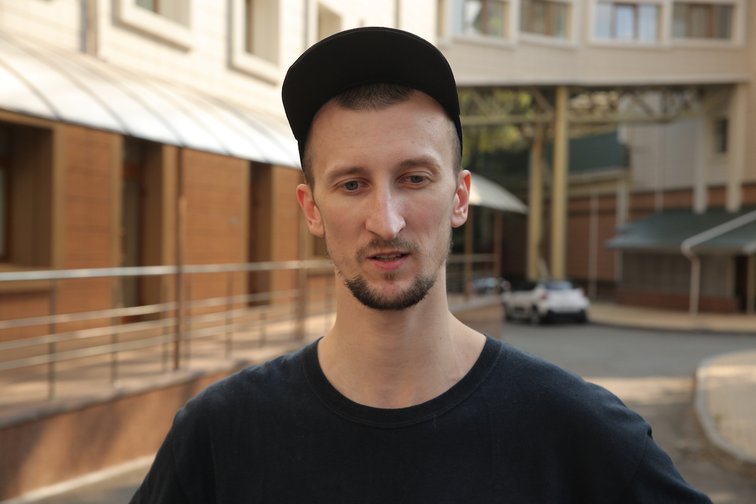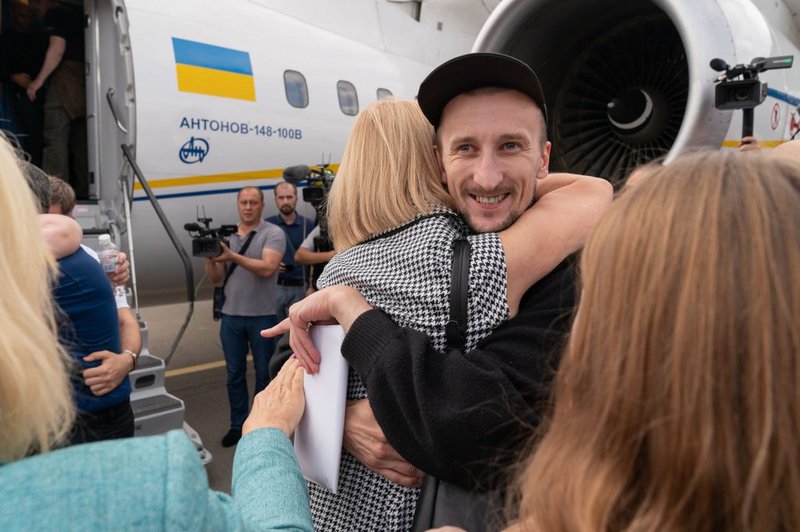
Oleksandr Kolchenko: “Some left-wingers in Europe have a distorted vision of Ukraine”
One year since Ukrainian political prisoner Oleksandr Kolchenko was released from a Russian prison, he speaks about his hunger strike, Crimea and left-wing views of Ukraine.
by Tetiana MatychakOleksandr Kolchenko is one of the best known former Ukrainian political prisoners. Together with Oleh Sentsov, he became the face of the protest movement of Ukrainian citizens in Crimea after Russia annexed the peninsula in 2014. In 2015, Kolchenko was sentenced to 10 years in prison for membership in a “terrorist group”, and joined Oleh Sentsov’s 145-day hunger strike in 2018.
Kolchenko was released as part of a prisoner exchange in September 2019, but according to a coalition of Ukrainian civil society organisations, there are still at least 100 Ukrainian citizens in detention in occupied Crimea or Russia. According to Ukraine’s Parliamentary Commissioner for Human Rights, the rights of the majority of Ukrainian political prisoners are subject to serious violations, including lack of access to medical treatment.
Precisely for this reason, Oleksandr Kolchenko became one of the three Ukrainian former political prisoners invited to take part in a augmented reality project - #PrisonersVoice. This mobile application will feature the voices of former political prisoners, who will talk users through the emotions behind their experiences - from the circumstances of arrest to life in a Russian prison colony.
Oleksandr Kolchenko talked to the #Prisonersvoice project about his hunger strike in prison, current sentiments in Crimea and left-wing views on Ukraine.
You lost ten kilograms in a week when you went on hunger strike in support of Oleh Sentsov in prison. How did you manage to endure it?
Before I started the hunger strike, I sent a letter to Putin asking him to intervene in the situation. I did this because I knew what kind of person Oleh is, and I knew that he would go to the end. Yet, time went by and nothing happened so I had to take action. I decided to support him in this way. However, I was not able to last more than a week. Police investigators said they would take me to hospital and feed me by force. So, I had to “raise the anchor”.
In one of your interviews you said you did not need psychological assistance. Where do you find strength to preserve mental resilience after everything you have been through?
First, there is outside support, correspondence. I got to know a lot of people. There were books, and they also gave me strength. I tried to communicate with as many people as possible inside the colony, while still keeping my distance.
No one could be trusted completely?
Absolutely! Perhaps, all these things helped.
Who supported you? People from Ukraine, Europe, the United States?
People from all over the world! When I was still in Moscow, my sister wrote: “We were living in a one-room apartment, and someone was staying with us the whole time. Even strangers at the request of mutual acquaintances”. And she wrote to me: “Half of the USSR has stayed at our place, and now they all support you.”
Did you live in Moscow for a while?
Well yes, a year and one month. In Lefortovo [prison]. Real estate almost in the city center! [smiles – ed.]
Which books did you read?
I read more inside than when I was free. Yet, I read less than I was able to because I was too lazy. In prison camp, I read The Adventures of the Good Soldier Švejk. This book is a great helper for surviving in those conditions. And I read a lot of other books as well – non-fiction and fiction literature, books on economics and so on.
In other words, you were supported by a sense of humor and self-development?
Yes. [smiles – ed.]
Do you monitor moods in Crimea? How have they changed over the past six years? Do you still know people who live there? We do not have any reliable survey results so we can only go by stories told by people we know.
Some people I know are still there, but it looks like since 2014 people in Crimea have become more closed, atomised. No one speaks openly about political issues. Even if someone is now disappointed about the choice they made in 2014, people find it difficult to recognise and admit their mistakes.
Do you know pro-Ukrainian people in Crimea?
Yes.
What would you recommend them – fight, speak openly or on the contrary, hide themselves?
It’s difficult to recommend anything, everyone has their own circumstances.
There are many Crimean Tatars currently imprisoned in Russia. Ukraine does everything possible to set them free. Do you participate in this process in any way? Do you help or follow this process?
I follow but I do not help, unfortunately. I don’t have the opportunity.
You are not involved directly?
No. However, there is the Association of Relatives of Political Prisoners [of the Kremlin], and they try to make this process more open and transparent so that family members know what is going on.

Are people from other countries interested to know what happens to Ukrainian and Russian political prisoners in Russia?
They are. But I heard from many people that in 2014 and in 2015 envoys of Borotba, a so-called “left-wing” organisation [Borotba, a Ukrainian communist organisation, supported pro-Russian separatists and Russia in 2014], were travelling around Europe telling people about “atrocities” happening in Ukraine, and that a so-called “fascist junta” had come to power in Ukraine. Therefore, some left-wingers in Europe have a distorted vision of Ukraine, Crimea and developments in Donbas.
Was the influence of Kremlin propaganda at play here as well?
Yes, through their envoys. One still has to explain how everything happens in reality here and now.
What would you like most of all now? Moral support from the Ukrainians, from the west?
There is enough support. Now it’s a question of making money myself, to support those who are still imprisoned on the Russian side of the border.
Do you raise money?
Right now I don’t have much money, my savings are nearly finished. That is why now I am trying to master a new profession – I am learning to draw with the [Adobe] Illustrator programme in order to earn money. And when I had an opportunity to gather something, when I went to Europe and had money remaining from my per diems, I gave it to a person I know in Russia, Vladimir Akimenkov. He raises money both for Ukrainian political prisoners in Russia, and for Russian political prisoners.
You are a supporter of anarchistic views. Today, the entire world follows the protests of the Black Lives Matter movement in the United States. Left-wing ideologies are also present there.
Left-wing views among others. Supporters of Maidan wanted to distance themselves from parallels with the US protests, but these parallels exist anyway because this protest is really vast. People with many various beliefs are taking part in the protests, just like Maidan in Ukraine. And people have also come out to protest against the arbitrary actions of police, just like Maidan in Ukraine. They are trying to re-think their colonial heritage, overcome it - just like Ukraine. This process is underway, but it has not been completed. For instance, in Odesa there’s still have a monument to Catherine the Great, who destroyed the Zaporizka Sich. However, the most important thing is not monuments, but the colonial heritage in people’s heads.
In your opinion, what supports this colonial heritage in Ukraine – television, education, ourselves or Russia’s influence?
Russia’s influence, yes. Agents of Russian interests, of pro-Russian parties and movements.
Note: the augmented reality application #PrisonersVoice is developed as part of a project implemented by CSO Internews-Ukraine with support from the Ukrainian Cultural Foundation in cooperation with the Center for Civil Liberties and other partners. The position of the Ukrainian Cultural Foundation does not necessarily coincide with the author’s opinion.
Who's getting rich from COVID-19?
Boris Johnson's government stands accused of 'COVID cronyism', after handing out staggering sums of money to controversial private firms to fight COVID-19. Often the terms of these deals are kept secret, with no value-for-money checks or penalties for repeated failures which cost lives. And many major contracts have gone directly to key Tory donors and allies – without competition.
As COVID rates across the country surge, how can we hold our leaders accountable? Meet the lawyers, journalists and politicians leading the charge in our free live discussion on Thursday 1 October at 5pm UK time.
Hear from:
Dawn Butler Labour MP for Brent Central and member of the House of Commons Committee on Science and Technology
Peter Geoghegan Investigations editor, openDemocracy, and author of 'Democracy for Sale: Dark Money and Dirty Politics'
Jolyon Maugham Barrister and founder of the Good Law Project.
Peter Smith Procurement expert and author of 'Bad Buying: How Organisations Waste Billions through Failures, Frauds and F*ck-ups'
Chair: Mary Fitzgerald Editor-in-chief of openDemocracy